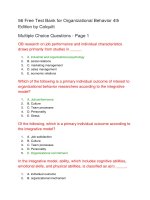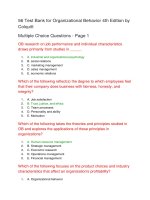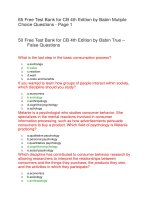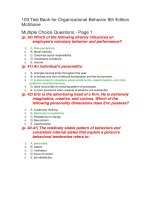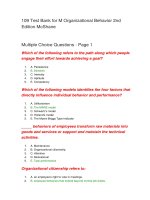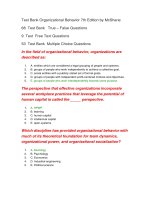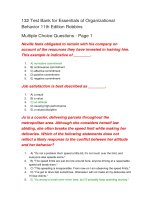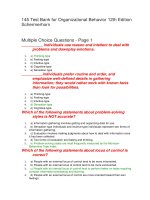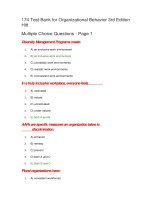56 free test bank with answers for organizational behavior 4th edition by colquitt
Bạn đang xem bản rút gọn của tài liệu. Xem và tải ngay bản đầy đủ của tài liệu tại đây (76.6 KB, 14 trang )
56 Free Test Bank for Organizational Behavior 4th
Edition by Colquitt
Multiple Choice Questions - Page 1
OB research on job performance and individual characteristics
draws primarily from studies in _____.
1.
A. industrial and organizational psychology
2.
B. social relations
3.
C. marketing management
4.
D. sales management
5.
E. economic relations
Which of the following is a primary individual outcome of interest to
organizational behavior researchers according to the integrative
model?
1.
A. Job performance
2.
B. Culture
3.
C. Team processes
4.
D. Personality
5.
E. Stress
Of the following, which is a primary individual outcome according to
the integrative model?
1.
A. Job satisfaction
2.
B. Culture
3.
C. Team processes
4.
D. Personality
5.
E. Organizational commitment
In the integrative model, ability, which includes cognitive abilities,
emotional skills, and physical abilities, is classified as a(n) _____.
1.
A. individual outcome
2.
B. organizational mechanism
3.
C. individual characteristic
4.
D. individual mechanism
5.
E. group outcome
Research on satisfaction, emotions, and team processes found in
OB draws heavily from studies in _____.
1.
A. anthropology
2.
B. organizational goals
3.
C. industrial relations
4.
D. social psychology
5.
E. team management
In the integrative model which organizational mechanism captures
shared knowledge about the rules, norms, and values that shape
employee attitudes and behaviors?
1.
A. Organizational structure
2.
B. Organizational ability
3.
C. Organizational culture
4.
D. Job satisfaction
5.
E. Organizational leadership
Which of the following is one of the two primary goals managers
have for their employees?
1.
A. Maximization of job performance.
2.
B. Optimization of stock price.
3.
C. Rationalization of job structure.
4.
D. Utilization of rational decision making techniques.
5.
E. Obedience to organizational rules and regulations.
Which of the following takes the theories and principles studied in
OB and explores the applications of those principles in
organizations?
1.
A. Human resource management
2.
B. Strategic management
3.
C. Economic research
4.
D. Operations management
5.
E. Financial management
_____ is a field of study devoted to understanding, explaining, and
ultimately improving the attitudes and behaviors of individuals and
groups in organizations.
1.
A. Organizational behavior
2.
B. Strategic management
3.
C. Economic research
4.
D. Operations management
5.
E. Financial management
As employees gain experience, they obtain job knowledge and use
this knowledge to make accurate judgments on the job. Which
individual mechanism is referred to in this statement?
1.
A. Team processes
2.
B. Trust, justice, and ethics
3.
C. Learning and decision making
4.
D. Personality and ability
5.
E. Motivation
Which organizational mechanism illustrated by the integrative
model dictates how the units within the firm link to other units?
1.
A. Organizational culture
2.
B. Organizational ability
3.
C. Organization size
4.
D. Organizational structure
5.
E. Organizational leadership
Which of these individual mechanisms captures the energetic
forces that drive employees' work efforts?
1.
A. Motivation
2.
B. Ability
3.
C. Job performance
4.
D. Personality
5.
E. Stress
_____ is the organizational mechanism in the integrative model that
captures "the way things are" in an organization.
1.
A. Organizational structure
2.
B. Organizational ability
3.
C. Organizational leadership
4.
D. Organizational performance
5.
E. Organizational culture
According to the integrative model of organizational behavior,
motivation, trust, justice, and ethics are _____.
1.
A. individual mechanisms
2.
B. organizational mechanisms
3.
C. group mechanisms
4.
D. individual outcomes
5.
E. group outcomes
Which of the following group mechanisms summarize how
individuals attain authority over others?
1.
A. Leader cultural values
2.
B. Leader personality
3.
C. Leader styles and behaviors
4.
D. Leader responsibilities
5.
E. Leader power and negotiation
Which of the following capture(s) the specific actions that leaders
take to influence others at work?
1.
A. Leader styles and behaviors
2.
B. Leader cultural values
3.
C. Leader personality
4.
D. Leader influence and negotiation
5.
E. Leader power
When a firm expands into a new product segment, it is known as
_____.
1.
A. product recall
2.
B. product diversification
3.
C. monopolization
4.
D. cartelization
5.
E. product divestment
Which of the following considers employees' psychological
responses to job demands that tax or exceed their capabilities?
1.
A. Job satisfaction
2.
B. Ability
3.
C. Job performance
4.
D. Leadership style
5.
E. Stress
OB primarily uses _______ models to understand motivation,
learning, and decision making.
1.
A. marketing
2.
B. economic
3.
C. labor union
4.
D. strategic
5.
E. cultural
According to the integrative model, job satisfaction is a(n) ______.
1.
A. individual outcome
2.
B. organizational mechanism
3.
C. group mechanism
4.
D. individual mechanism
5.
E. group outcome
Which of the following is an example of a group mechanism?
1.
A. Team characteristics and diversity
2.
B. Motivation
3.
C. Trust, justice, and ethics
4.
D. Organizational commitment
5.
E. Ability
Which of the following focuses on the product choices and industry
characteristics that affect an organization's profitability?
1.
A. Organizational behavior
2.
B. Process management
3.
C. Operations management
4.
D. Strategic management
5.
E. Human resource management
Which of the following statements about the resource-based view of
organizations is false?
1.
A. It suggests that resources are valuable because they are rare.
2.
B. It describes what makes resources capable of creating long-term profits for
the firm.
3.
C. It suggests that inimitable resources are of greater value to an
organization.
4.
D. A firm's resources include resources related to organizational behavior.
5.
E. It suggests that the value of resources depends on a single factor.
Which of the following individual characteristics illustrated in the
integrative model of OB reflect the various traits and tendencies that
describe how people act, with commonly studied traits including
extraversion, conscientiousness, and collectivism?
1.
A. Trust, justice, and ethics
2.
B. Personality and cultural values
3.
C. Job performance and organizational commitment
4.
D. Learning and decision making
5.
E. Organizational structure and organizational culture
Which of the following reflect(s) the degree to which employees feel
that their company does business with fairness, honesty, and
integrity?
1.
A. Job satisfaction
2.
B. Trust, justice, and ethics
3.
C. Team processes
4.
D. Personality and ability
5.
E. Motivation
56 Free Test Bank for Organizational Behavior 4th
Edition by Colquitt Multiple Choice Questions - Page 2
Choose the method which suggests that people accept some belief
because scientific studies have tended to replicate that result using
a series of samples, settings, and methods?
1.
A. Method of intuition
2.
B. Method of authority
3.
C. Method of science
4.
D. Method of experience
5.
E. Method of behavior
Which of the following suggests that people hold firmly to some
belief because it "just stands to reason"—it seems obvious or selfevident?
1.
A. Method of intuition
2.
B. Method of authority
3.
C. Method of science
4.
D. Method of experience
5.
E. Method of behavior
Which of the following is not one of the methods by which people
"know" things?
1.
A. Method of education
2.
B. Method of experience
3.
C. Method of intuition
4.
D. Method of authority
5.
E. Methods of science
Which of the following argues that scientific findings should form the
foundation for management education?
1.
A. Traditional Management
2.
B. Evidence-based management
3.
C. Resource-based view
4.
D. Contingency approach
5.
E. Management by objectives
Which of the following conditions is necessary to establish causal
inferences?
1.
A. The study was conducted in an open environment.
2.
B. No alternative explanation exists for the correlation.
3.
C. The presumed effect precedes the presumed cause in time.
4.
D. The two variables are not correlated.
5.
E. The sample size is large enough.
According to the Rule of One-Eighth,
1.
A. at least 88 percent of organizations will do everything necessary to put
people first and thereby build profits.
2.
B. at best 12 percent of organizations will actually do what is required to build
profits by putting people first.
3.
C. 75 percent of organizations won't believe the connection between how they
manage their people and the profits they earn.
4.
D. 38 percent of the organizations try to make a single change to solve their
problems.
5.
E. one in eight organizations miserably fails at making the people to profit
connection.
Tran is interested in the effects of the choice of reward on employee
motivation. She knows that there have been several studies done
on this subject and compares their results looking for an average
correlation. Tran is conducting a ______.
1.
A. meta-analysis
2.
B. mediocre analysis
3.
C. medial analysis
4.
D. remedial analysis
5.
E. moderated analysis
Of the following methods, which suggests that people hold firmly to
some belief because some respected official, agency, or source has
said it is so?
1.
A. Method of intuition
2.
B. Method of authority
3.
C. Method of science
4.
D. Method of experience
5.
E. Method of behavior
_______ are written predictions that specify relations between
variables.
1.
A. Hypotheses
2.
B. Verifications
3.
C. Theories
4.
D. Data
5.
E. Collections
Culture, trust, teamwork, and reputation are termed "_____"
because it's not always clear how they came to develop, though it is
clear which organizations do possess them.
1.
A. socially complex
2.
B. vague
3.
C. natural structures
4.
D. evidence-based resources
5.
E. associative structures
Which of these is one of the conditions necessary to establish
causal inferences?
1.
A. The two variables are not correlated.
2.
B. Multiple alternative explanations exist for the correlation.
3.
C. The presumed cause precedes the presumed effect in time.
4.
D. The study was conducted in an open environment.
5.
E. The sample size is large enough.
Frank, an HR manager, believes that his implementation of HR
practices in the company is impeccable, because he received the
inputs for these practices from the CEO himself. Which of the
following philosophies is he relying on?
1.
A. Method of intuition
2.
B. Method of behavior
3.
C. Method of science
4.
D. Method of experience
5.
E. Method of authority
In the 1960s, a popular ad stated that "Blondes have more fun!"
This is an example of ______.
1.
A. a positive correlation
2.
B. negative causation
3.
C. data
4.
D. verification
5.
E. a proven fact
Which of the following correlations indicate a perfect statistical
relationship between two variables?
1.
A. 1
2.
B. -1
3.
C. 0
4.
D. 100
5.
E. -100
Which of the following explains the term causal inferences?
1.
A. Proving that two variables are correlated.
2.
B. Making sure the sample size is adequate enough.
3.
C. Explaining why one variable is not correlated to another.
4.
D. Analyzing a situation and understanding what went wrong.
5.
E. Establishing that one variable really does cause another.
Which of the following correlations indicate no statistical relationship
between two variables?
1.
A. 1
2.
B. -1
3.
C. 0
4.
D. 100
5.
E. -100
The resource-based view of organizations suggests that a resource
is more valuable when it is _____.
1.
A. complex
2.
B. simple
3.
C. inimitable
4.
D. expensive
5.
E. new
The level of creativity demonstrated by PIXAR animators is rare.
Therefore, according to the _______, these employees are valuable
to the firm.
1.
A. resource-based view of organizations
2.
B. integrative theory of organizational behavior
3.
C. normative selection model
4.
D. economic theory of the firm
5.
E. performance based theory of organizations
_______ summarize the statistical relationships between variables.
1.
A. Datasets
2.
B. Correlations
3.
C. Observations
4.
D. Collections
5.
E. Consolidations
Which of the following methods suggests that people hold firmly to
some belief because it is consistent with their own experience and
observations?
1.
A. Method of intuition
2.
B. Method of authority
3.
C. Method of science
4.
D. Method of experience
5.
E. Method of behavior
The resource-based view suggests that a resource is more valuable
when it is _____.
1.
A. complex
2.
B. technologically advanced
3.
C. socially complex
4.
D. rare
5.
E. simple
Correlation can be positive or negative and can range from _____.
1.
A. -1 to +1
2.
B. -2 to +2
3.
C. 0 to +100
4.
D. -10 to 0
5.
E. -100 to +100
In organizational behavior research, a correlation of +1 between
two variables is considered:
1.
A. weak.
2.
B. to be an absence of relationship.
3.
C. arbitrary.
4.
D. irrelevant.
5.
E. perfect.
The scientific method requires that theories be used to inspire
_____.
1.
A. auditing
2.
B. hypotheses
3.
C. experience
4.
D. verification
5.
E. intuition
Who is considered to be the originator of the scientific method?
1.
A. Jeffrey Pfeffer
2.
B. Frederick Taylor
3.
C. Charles Darwin
4.
D. Sir Francis Bacon
5.
E. Adam Smith
The scientific method begins with _____.
1.
A. auditing
2.
B. hypotheses
3.
C. theory
4.
D. verification
5.
E. paradigm
Which of these takes all the correlations found in studies of a
particular relationship and calculates a weighted average of them?
1.
A. Alpha analysis
2.
B. Gamma analysis
3.
C. Meta-analysis
4.
D. Causal analysis
5.
E. Beta analysis
Culture, teamwork, trust, and reputation are examples of _____.
1.
A. socially complex resources
2.
B. easy-to-develop resources
3.
C. natural structures
4.
D. evidence-based resources
5.
E. associative structures
_____ is defined as a collection of assertions that specify how and
why variables are related, as well as the conditions in which they
should and should not be related.
1.
A. Hypothesis
2.
B. Information
3.
C. Paradigm
4.
D. Data
5.
E. Theory
Which of these is one of the conditions necessary to establish
causal inferences?
1.
A. The presumed cause succeeds the presumed effect in time.
2.
B. Multiple alternative explanations exist for the correlation.
3.
C. Factors other than the variables in question could create causation.
4.
D. The two variables are correlated.
5.
E. The sample size is large enough.
Donna believes that 360 degree performance review is ideal for her
company because she recently read about a major survey of
Fortune 100 companies that highlighted the effectiveness of this
method. Which of the following philosophies is she relying on?
1.
A. Method of intuition
2.
B. Method of performance
3.
C. Method of behavior
4.
D. Method of reliability
5.
E. Method of science

